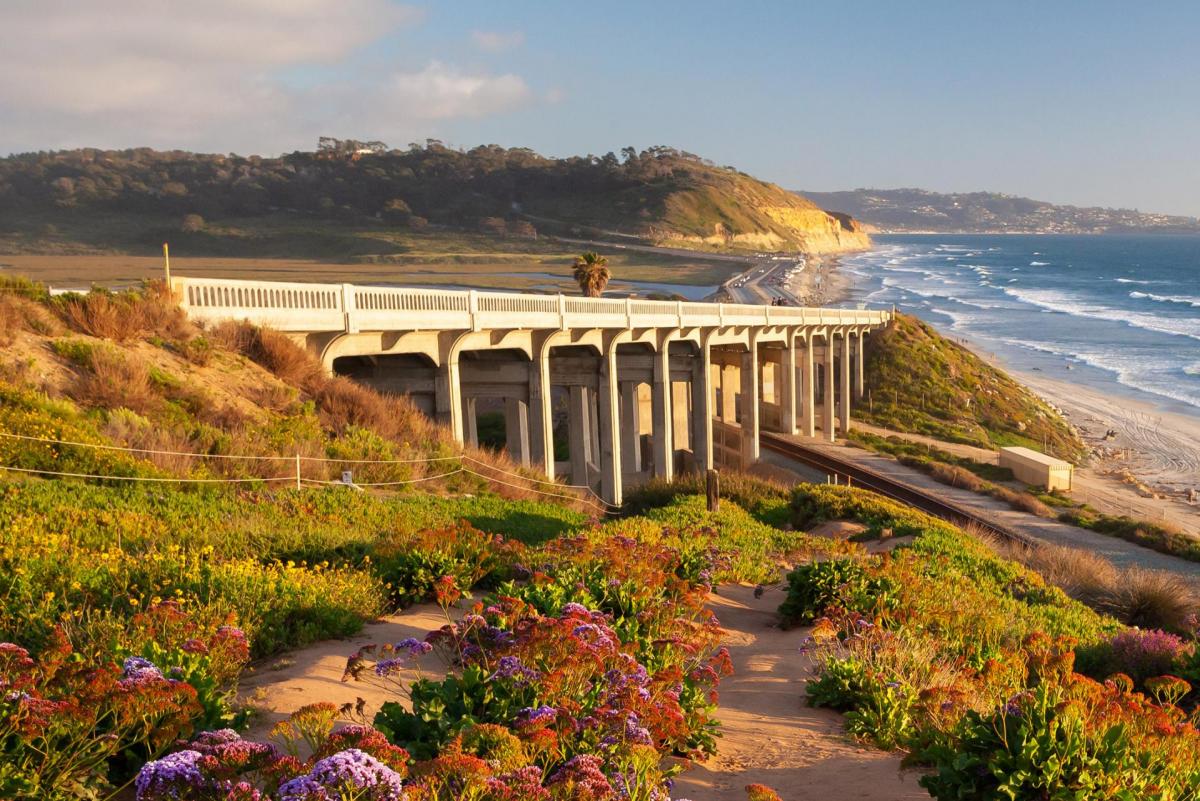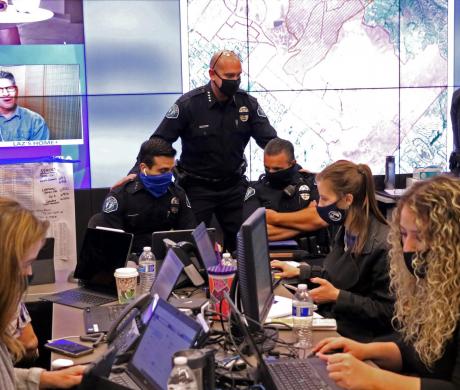2021 Legislative Year in Review
Melanie M. Perron is the deputy executive director of advocacy and public affairs for the League of California Cities and can be reached at mperron@calcities.org.
For many, the beginning of 2021 felt like a continuation of 2020. COVID-19 continued to significantly impact the globe and cities throughout the state were still reeling from the economic impacts of the pandemic. Any guarantee of state or federal relief for cash-strapped cities was tepid at best. One silver lining was that the League of California Cities was able to build upon key relationships in the Legislature to advance top priorities for cities in 2021.
Many important bills that died in 2020 came back, often with favorable results for cities. Moreover, the state’s historic budget surplus of $100 billion, along with $8 billion for California cities through a federal relief package, created new opportunities to fund an array of city priorities.
Lawmakers were also more focused this year, introducing a whopping 2,421 bills, far more than in 2019 or 2020. Cal Cities monitored more than 70% of the bills introduced and engaged on the most important measures to cities. Of the 836 bills to reach the Governor’s desk, 92% were signed. Further, the Governor’s actions aligned with Cal Cities’ positions on bills 70% of the time, highlighting how critical it is that we engage on bills in the legislative process to try to stop or get amendments to those impacting cities the most.
Although this year seemed in many respects to be a repeat of 2020, the legislative results were anything but. Cal Cities’ many — and at times, monumental — wins this year at the state and federal level have demonstrated the strength of our organization, and most importantly, our members. Together, we successfully advanced each legislative priority in our 2021 Action Agenda.
An $8 billion lifeline for cities
At the beginning of the year, the state announced that it was flush with cash, despite predictions to the contrary, and the federal government was poised to deliver billions in aid to American families and businesses in yet another relief package. Unfortunately, both seemed reluctant to provide funding relief for cities, which had provided many new, pandemic-related services while maintaining existing services with shrinking budgets. Statewide, cities were facing a $7 billion shortfall. Save for $500 million in CARES Act state funding in 2020, cities had been left to fend for themselves.
Many powerful lawmakers at the federal level openly balked at the idea of providing any relief to cities. However, in March, Cal Cities’ year-long research, lobbying, and grassroots efforts finally paid off. Thanks to strong partnerships with the state of California and our Support Local Recovery coalition, as well as national partners like the National League of Cities, Cal Cities delivered on its first Action Agenda item: $8 billion in direct, flexible funding for cities of all sizes through the American Rescue Plan Act. The historic funding package has already had a transformative effect on many communities.
However, dollars do not guarantee success. Cal Cities worked closely with the U.S. Department of the Treasury and the California Department of Finance throughout the year to ensure cities’ concerns were addressed during the federal rulemaking process and that the application process was streamlined. Those partnerships ensured that every city in California received American Rescue Plan Act dollars.
Working closely with the Department of Finance to get processes established quickly helped California be one of the first states to distribute funding to all its municipalities, whereas other states continue to struggle to do so. Cal Cities’ involvement was key to ensuring expedited and streamlined distribution of funds here at home while also keeping city officials updated with important information about resources and processes to access these funds through regular updates on the Cal Cities Guide to Local Recovery webpage.
The state made a significant investment in the production of affordable housing, but high-profile housing bills undermined local control
For years, Cal Cities has sought ongoing dedicated funding from the state to help address California’s affordable housing crisis while preserving local decision-making. And for years, the state and Legislature has responded by proposing — or worse, passing — inflexible statewide mandates that prioritize the needs of developers over local communities, while simultaneously failing to provide any long-term resources to help cities plan for housing. Some bills have even upended or hindered existing housing plans. As a Cal Cities legislative priority this year, we fought hard to stave off housing bills that were most harmful to cities and supported bills to help cities plan for more housing. Some of the housing bills that undermine local decision-making made it through and were signed by the Governor, while important budget bills were largely positive for cities.
The state continued this year to make homelessness a budget priority. In total, the 2021-22 budget provides $10 billion for affordable housing and homeless programs. The budget specifically includes more than $2 billion over the next two years to help cities address homelessness and $2.2 billion for Homekey. The budget also includes more than $750 million to support affordable housing development. This funding marks an important shift from providing less generous, one-time funding to cities to address homelessness, to the state providing $1 billion annually for the next two years. Additionally, the Legislature and the Governor have committed to making funding to address homelessness an annual priority.
In another significant win for cities, several bills infringing upon local control became two-year bills or failed to advance entirely, including AB 500 (Ward), AB 1401 (Friedman), and AB 989 (Gabriel). These bills would have added more decision-makers to the housing plan process, which would adversely impact cities, and would have likely stalled existing efforts to build more affordable housing.
Unfortunately, two bills of significant concern were ultimately signed into law, despite the fervent objections of California’s city leaders: SB 9 (Atkins) and AB 215 (Chiu). More than 240 cities joined Cal Cities in opposition to SB 9, which will require local governments to ministerially approve a housing development containing two residential units in single-family zones and urban lot splits. This ‘by right’ or mandatory approval scheme changes the rules midstream and as a result, may hinder housing plans already being implemented.
AB 215 slows existing housing efforts by adding a step to the housing element certification process requiring 40 additional days. Moreover, a last-minute amendment created a new three-year statute of limitations for any housing plan enforcement process. It also allows the Department of Housing and Community Development to appoint or contract with other counsel to represent the department in such cases if the Attorney General declines to represent them.
Cal Cities expects to see additional proposals over land use authority in the next session, particularly on state funding reporting requirements — which were not fully codified in this year’s budget trailer bills — and single-family zoning. Cal Cities continues to prioritize the need for resources that support the construction of affordable housing while preserving local control. Ultimately, this problem affects all Californians and requires extensive collaboration at the local, regional, and state levels.
California passes largest public broadband infrastructure investment in the country
The pandemic shined a glaring floodlight on many of the state’s inequities, including the massive digital divide. For years, Cal Cities has advocated for high-quality, affordable broadband in rural, urban, and suburban communities. In 2020, Cal Cities came close to securing a funding package, which ultimately crumbled due to legislators in-fighting during the end-of-session chaos, while many Californians struggled to stay connected while working from home and or attending school remotely.
Protecting and modernizing infrastructure was another Cal Cities priority this year and we pushed legislators hard on the issue. By the summer our efforts paid off. In July, the state passed a $6 billion broadband package. Until the passage of the federal government’s Infrastructure Investment and Jobs Act, this was the country’s largest ever public broadband infrastructure investment. Unlike previous funding attempts, this bill provides local leaders more opportunities to participate in broadband deployment. It also prioritizes the construction of networks in unserved areas, as well as those with lower speeds not suitable for education, commerce, and video conferencing. This ensures that services benefit those needing them the most.
Cal Cities also worked closely with Assembly Member Cecilia Aguiar-Curry and Senator Lena Gonzalez, who have both long advocated for high-speed, widely available, and reliable broadband to develop two complementary bills: AB 14 (Aguiar-Curry) and SB 4 (Gonzalez). The two measures prioritize equitable broadband deployment and make important separate tweaks to the California Advanced Services Fund, which supports broadband deployment. While a last-minute industry push was made to kill SB 4, cities came out strong, advocating to legislators about the need for these bills, which secured their passage in the Legislature and the Governor’s signature on both bills. These two lawmakers were honored for their persistent work to bring broadband to California’s unserved and underserved neighborhoods with the 2021 Distinguished Legislative Leadership Award at the Cal Cities 2021 Annual Conference and Expo.
AB 14 and SB 4 also were accompanied by a welcomed veto of SB 556 (Dodd), which would have forced local governments to make space on public infrastructure available to telecommunications providers. The Governor’s veto message largely mirrored Cal Cities’ arguments, with Gov. Gavin Newsom noting that provisions of the bill “conflict with and complicate some of the FCC requirements.” He also stated, “part of our achievements laid out in the broadband budget bill, SB 156 (Chapter 112, Statutes of 2020), enables and encourages local governments to take an active role in last mile deployment and, in doing so, drive competition and increase access.”
Cities could not have had a better year regarding affordable and reliable broadband. Collectively, these wins are the result of years of continued intense advocacy from Cal Cities and its members. Cities put themselves at the forefront of a national conversation about broadband access and demonstrated their capability to provide high-quality services to all their residents. In doing so, we were able to fend off bad bills and lay the groundwork for transformative change in cities.
Cal Cities secures much-needed funding for disaster preparedness, resiliency, and recovery
With unprecedented pandemic-related shortfalls, legislators and the Governor were forced to rework the 2020 state budget. One of the first major areas chopped was funding for disaster preparedness, resiliency, and recovery. The narrative was substantially different in 2021. For starters, the state’s coffers were overflowing providing significant opportunities to create and reimagine programs and provide resources. Second, California was entering another devastating — and likely multi-year drought — as well as an increasingly long and volatile fire season. It was clear that direct, flexible funding was desperately needed for those on the frontlines of climate change: cities.
With strengthening community disaster preparedness, resiliency, and recovery as another Cal Cities priority in 2021, and building on last year’s work, Cal Cities partnered with key legislators to secure $4.5 billion in the state budget to help cities prepare for, fight, and recover from wildfires, as well as update local coastal plans and fund urban climate resiliency programs. In the final days of the legislative session, lawmakers also passed SB 155 (Committee on Budget and Fiscal Review) and SB 170 (Skinner), two trailer bills that provide millions for climate resiliency and disaster preparedness. Notably, SB 155 contains an ongoing, ten-year appropriation of $200 million to CAL FIRE for healthy forest fire prevention programs, prescribed burns, and other fuel reduction projects.
In 2020, the state could not even agree on a one-time climate change package. This year, every issue area, from sea level rise to extreme heat mitigation, received state funding.
Major Brown Act relief secured; proposed unfunded mandate vetoed
In addition to Cal Cities’ top four priorities in our 2021 Action Agenda, other issues emerged and were a focus for our advocacy efforts. Unsurprisingly, Brown Act relief and modernization was a critical priority issue for many city officials in 2021. Last March, the Governor issued Executive Order N-29-20, which was followed by subsequent executive orders, allowing cities to conduct remote meetings under modified Brown Act requirements. The Legislature passed, and the Governor signed, AB 361 (Robert Rivas) shortly before the order was set to expire, which lets cities conduct remote meetings under some similar conditions and rules, while also expanding this to include any declared state of emergency. At the urging of Cal Cities and other local government associations, the bill was amended to include an urgency clause, allowing cities to provide services and conduct city business safely and uninterrupted.
From the moment AB 339 (Lee) was introduced, Cal Cities led a coalition in strong opposition to the bill. While cities are committed to conducting public meetings transparently and providing opportunities for public participation, AB 339 was the wrong approach. The bill failed to consider the practical impacts of unlimited remote public comment on local agencies’ ability to both deliberate and act on items of importance to the public. The measure would have required cities to provide call-in and internet-based options, in addition to in-person options, for members of the public during any public meeting. By not including any clear ability to limit participation or length of testimony, the bill would have allowed a relatively small group of people from anywhere in the world to disrupt a local government meeting. With continued pressure from Cal Cities and local governments, the bill was significantly amended but remained problematic.
Although AB 339 passed out of the Legislature, it eventually was vetoed by the Governor, who shared many of Cal Cities’ concerns. He noted that the bill would “set a precedent of tying public access requirements to the population of jurisdiction,” “limits flexibility and increases costs for the affected local jurisdictions trying to manage their meetings,” and “puts the health and safety of the public and employees at risk.”
The Governor’s veto of AB 339 is important; however, much work remains to be done. As such, we are actively looking at ways to revise and modernize the Brown Act to increase public access while protecting public health and safety.
Pandemic regulatory relief maintains local control
In a move to support California’s pandemic recovery, the Governor and the Legislature almost unanimously approved several pieces of legislation to build upon some of the state’s more successful pandemic-era rules: SB 314 (Wiener), AB 61 (Gabriel), and SB 389 (Dodd). All three Cal-Cities supported measures provide some regulatory flexibility or relief to qualified businesses serving alcoholic beverages in nontraditional spaces due to indoor dining restrictions. Cal Cities worked closely with SB 314’s and AB 61’s authors to secure key amendments that preserve local authority.
A good year for organic waste diversion
Although Cal Cities focuses much of its advocacy efforts on its yearly Action Agenda, it is also responsive to the evolving needs of cities. One key issue in 2021 was the need for additional funding and time to implement SB 1383 (Lara, Statutes of 2016) organic waste diversion regulations. Cal Cities worked closely with its members through a survey and a series of roundtables to determine the extent of the issue and with Senator John Laird on a legislative solution.
A longtime assembly member, former budget chair, and former Natural Resources Agency Secretary, Senator Laird was instrumental in helping cities secure funding and flexible compliance pathway. SB 170 (Skinner) includes $60 million in grant funding to help cities implement SB 1383 regulations and more than $100 million for organic waste infrastructure. Although far less than Cal Cities’ original ask, it is still the largest amount of money ever set aside for cities in a single fiscal year for SB 1383 implementation. Additionally, SB 619, which Senator Laird authored, gives local governments a pathway to compliance with SB 1383 and Cal Cities more time to secure additional SB 1383 funding.
Senator Laird was ultimately awarded the 2021 Distinguished Legislative Leadership Award at Cal Cities 2021 Annual Conference and Expo for his work in providing additional funding and time for SB 1383 regulations.
A good year for other environmental issues
For years, Cal Cities has been heavily involved in attempts to overhaul California’s plastic recycling system, a desire shared by many lawmakers, most notably Senator Ben Allen. This year, several innocuous, but notable recycling bills finally passed — despite fervent opposition from industry groups, potentially setting up a larger fight in 2022, including at the ballot box.
One of the more noteworthy measures is SB 343 (Allen) which clarifies which materials are suitable for recycling. Due to decades of greenwashing, many consumers wrongly assume that all materials with the word “recyclable” or the “chasing arrows” symbol are recyclable. These designations now will be reserved for materials that are truly recyclable and routinely sold to manufacturers to make new products. These changes will reduce contamination, lower waste volume, and improve recycling rates. SB 343 passed due to a coalition of nonprofits and local government partners, including Cal Cities.
Cal Cities also worked closely with cities and lawmakers to pass AB 1311 (Wood). Cal Cities, along with the California State Association of Counties and the Rural County Representatives of California, identified a crisis-in-making early on — zero access to certified recycling centers in numerous counties. Using that information, Assembly Member Jim Wood crafted AB 1311, which expands the number of beverage container redemption opportunities under the California Beverage Container Recycling and Litter Reduction Act. The bill, which is a strong step in the right direction, will help create new opportunities for consumers to redeem their California Redemption Value and preserve the program’s core functions.
Unlike last year, dozens of environmental quality bills advanced to the Governor’s desk. Other significant bills include SB 1 (Atkins), which establishes new planning, assessment, funding, and mitigation tools for California to address and respond to sea level rise, and SB 323 (Caballero), a measure that gives public agency water and sewer rates the same protections already afforded to fees and charges that fund other essential government services.
Key transportation funding legislation
Transportation funding continues to be an issue for cities struggling to maintain their roads, streets, and bridges. Cal Cities secured much-needed relief to the maintenance of effort requirements under SB 1 (Chapter 5, 2017), which were included in the budget bill. This relief provides a two-year exemption from the state’s annual minimum expenditure requirements in the 2019-20 fiscal year, with proportional adjustments to their fiscal obligations through the 21-22 fiscal year.
While this was welcome news to many cities, others continued to seek creative ways to leverage their existing funds to help deliver needed local and regional projects. One strategy was to finance projects by partnering with other jurisdictions to pool transportation funds. However, under SB 1 (Beall, Statutes of 2017), it was unclear if cities had the authority to jointly sponsor local streets and roads projects. Cal Cities-backed legislation, SB 640 (Becker), clarified this additional flexibility for cities to access the funding while teaming up with other cities or counties.
Under SB 640, two or more eligible cities, or one or more cities and a county, can combine resources on projects that affect multiple jurisdictions. The bill also consolidates reporting requirements into a single report making it easier for cities to provide the required information. A desperately needed bill, both changes will allow cities to negotiate more competitive rates, thus maximizing SB 1 dollars on regional projects, and adding flexibility to the spending of that funding.
While this is a step in the right direction, continued talks around a more sustainable funding source for road maintenance and construction are urgently needed.
Major pension bill unfairly punishes cities
Despite opposition from Cal Cities members and coalition partners SB 278 (Leyva) will become law in 2022. Under SB 278, if CalPERS determines that compensation agreed to under a collective bargaining agreement is non-pensionable, cities must pay penalties to the affected retired member, survivor, or beneficiary and CalPERS, with 10% going directly to CalPERS. This creates both a conflict of interest for CalPERS and places 100% of the total liability for such overpayments on public agencies. SB 278 is a de facto and retroactive benefit enhancement measure that will further strain local agency budgets at a time when the impacts of COVID-19 and retirement obligations are making it exceedingly difficult to effectively provide critical services for the public.
Revenue and taxation measures yield mostly positive results
This year, lawmakers were reluctant to alter existing revenue and taxation laws as many communities were still struggling to recover from the pandemic. This is in part because Cal Cities worked extensively to educate key lawmakers about these impacts, resulting in several bills being held. As a result, 2021 was a good year for cities in the revenue and taxation space, except for a key sales tax measure that failed to secure the Governor’s signature.
Two Cal Cities-supported bills, SB 60 (Glazer) and SB 219 (McGuire), were passed and signed. SB 60 allows cities and counties to impose larger fines for violations of short-term rental ordinances up to $5,000 for each violation, which will help prevent public health and safety violations related to short-term rentals. SB 219 provides much-needed flexibility to residents unable to pay their property taxes due to economic hardship caused by a shelter-in-place order. Additionally, SB 555 (McGuire), a bill that would have resulted in less effective tax collection from short-term rentals, was turned into a two-year bill.
SB 792 (Glazer) aimed to better inform the public’s understanding of online transactions and the flow of goods across the state with new, modernized reporting requirements. Cal Cities members and others advocated for better data about these transactions. However, the Governor vetoed the bill, noting that it creates a “burdensome and costly new reporting requirement for many retailers that is unrelated to their tax obligations.” Cities will have to continue relying on current analysis, which is constrained to modeling based on transaction and use tax (district tax) data from about half of California’s 482 cities.
Key amendments secured for significant police reform bills
After the senseless death of George Floyd and the civil unrest that followed, it became clear that public safety and police reform policy would be a major priority of the Legislature this session. The Cal Cities Board of Directors voted in December 2020 to create a Public Safety Task Force, which would provide feedback and recommendations on public safety policy priorities. This allowed Cal Cities to remain highly engaged on these issues throughout the year, negotiating amendments that removed some of the more contentious elements for cities, while preserving the bills’ core functions and promoting appropriate transparency, reporting, and certification standards.
Cal Cities, California State Sheriffs Association, and the California Correctional Peace Officers Association played a key role in securing amendments to SB 16 (Skinner). As previously drafted, the measure would have made every incident involving unreasonable or excessive force and any sustained finding that an officer failed to intervene in such cases subject to disclosure. The bill now only mandates the disclosure of substantiated claims. Cal Cities and others removed their opposition, paving the way for the Governor’s eventual signature.
Cal Cities also secured substantial amendments to SB 2 (Bradford), which undercuts the federally held doctrine of qualified immunity and outlines a largely unworkable peace officer decertification process. The amendments Cal Cities negotiated addressed financial concerns related to lawsuits under the Tom Bane Civil Rights Act, which would have seriously impacted cities financially. While these were critical amendments, Cal Cities remained opposed to the bill largely due to the new Peace Officer Standards and Training Commission advisory board, which removes police chiefs from the decision-making process. Despite our continued opposition, the Governor signed this measure.
Cal Cities supported AB 89 (Jones-Sawyer) after the author addressed concerns about the measure’s impact on recruitment and a lack of access to higher education in some communities. The signed bill takes a nuanced, collaborative, and thoughtful approach to the law enforcement certification process. This measure includes the requirement to create a modern policing degree program by June 2023, as well as recommendations to provide financial assistance for students from historically underserved and disadvantaged communities.
One of the last bills the Governor acted on was AB 603 (McCarty), which he vetoed. The bill would have required cities to post details about money spent on law enforcement-related settlements and judgments online. Cal Cities argued that the measure would both undermine trust — as most defendants settle with the plaintiff out of economic necessity — and impose a significant, non-reimbursable cost statewide. The Governor partially agreed with Cal Cities, noting that the information is already available and could “have potentially significant General Fund costs associated with [it].”
The bills passed this year largely mirror Cal Cities’ recently adopted peace officer decertification process policy. Bad actors need to be held accountable, but in a way that does not remove cities from the decision-making process. Bills like SB 2 (Bradford), while far from perfect, make moves in the right direction. Cal Cities will continue to focus advocacy efforts on improving that process and ensuring its transparency and effectiveness.
Outlook for 2022
In short, 2021 yielded positive legislative results for cities, largely thanks to the efforts of Cal Cities and California’s city officials. Despite monumental — and at times, seemingly insurmountable challenges — local leaders rose to the occasion and made sure lawmakers knew how bills would impact their communities.
But city leaders were not just their greatest advocates. They also demonstrated that, when given the right tools and information, cities can find solutions to some of the nation’s most pressing problems. Working together with state and federal lawmakers, Cal Cities and its members were able to deliver some truly historic outcomes for California’s many diverse communities.
2022 will undoubtedly be another interesting year. Several key housing bills that failed to materialize may resurface in 2022, and a statewide drought and the continuing effects of climate change will influence many legislative conversations around water infrastructure, disaster preparedness, and climate resiliency. Pension sustainability, infrastructure funding, and other public safety reforms will also remain hot-button issues — all as local communities continue to recover from the economic and public health impacts of the pandemic.
The policy fight will not just be confined to the halls of the Capitol. Next year is also an election year, which means voters will be asked to decide the fate of several ballot initiatives in November 2022, many of which will significantly impact cities.
The 2022 election, as well as new redistricting lines, will certainly impact decisions and priorities in Sacramento. The Governor, as well as many lawmakers, will be up for reelection, some in new legislative districts. The election will most likely impact the Legislature’s agenda but given the Governor’s large margin of victory in the recall election, it’s difficult to anticipate how his reelection campaign may impact his priorities in 2022.
Given the magnitude of legislative issues that are left to be resolved and the ballot measure fights ahead of us, it will be more important than ever that in 2022 cities are united in their effort to affirm local decision-making. Cal Cities will continue to fight on behalf of cities to ensure that their voices are heard loud and clear in the Capitol and remain laser-focused on advancing the priorities that matter most to city leaders.
Together, we will work to uphold local authority, advance our legislative priorities, and improve the quality of life for all Californians.










